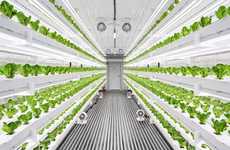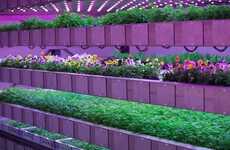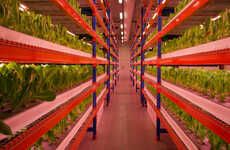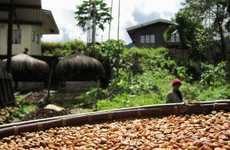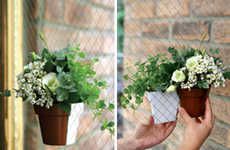
Vertical Farms for the AWR Competition are the Future of London
Omar Yusuf — September 13, 2011 — Eco
References: awrcompetitions & treehugger
The attached designs for AWR's LOFT 2011 competition may be unconventional, but you'd better get used to the idea of vertical farms because they're among the most efficient means of food production and urban transportation.
AWR is an annual competition held between architects, industrial designers and urban planners -- this year, the contest challenged experts to conceptualize vertical farms. An important caveat, however, is that these urban pastures would have to include residential elements. Although only one winner was announced, all of the entries succeeded in marrying eco-friendly architecture with beautiful, avant-garde designs. One submission, entitled 'Cultivated Carousel,' cultivates food by placing plants onto rotating wheels.
But don't be turned off by the strangeness of these illustrations -- having a farm somewhere in your apartment building will be an integral part of life in the future.
AWR is an annual competition held between architects, industrial designers and urban planners -- this year, the contest challenged experts to conceptualize vertical farms. An important caveat, however, is that these urban pastures would have to include residential elements. Although only one winner was announced, all of the entries succeeded in marrying eco-friendly architecture with beautiful, avant-garde designs. One submission, entitled 'Cultivated Carousel,' cultivates food by placing plants onto rotating wheels.
But don't be turned off by the strangeness of these illustrations -- having a farm somewhere in your apartment building will be an integral part of life in the future.
Trend Themes
1. Vertical Farms - Disruptive innovation opportunity: Develop efficient and sustainable urban farming systems to meet the growing demand for food in densely populated areas.
2. Eco-friendly Architecture - Disruptive innovation opportunity: Create environmentally friendly buildings that integrate food production systems, helping to reduce carbon footprints and reliance on traditional agriculture.
3. Residential Farming - Disruptive innovation opportunity: Design residential buildings that incorporate vertical farms, providing residents with access to fresh and locally grown produce.
Industry Implications
1. Architecture - Disruptive innovation opportunity: Collaborate with architects to design buildings that seamlessly integrate vertical farms, revolutionizing urban landscapes.
2. Agriculture - Disruptive innovation opportunity: Develop new technologies and methods for growing crops in vertical farm settings, increasing the efficiency and productivity of urban agriculture.
3. Urban Planning - Disruptive innovation opportunity: Rethink urban planning strategies to incorporate vertical farms as essential components of sustainable and self-sufficient cities.
2.6
Score
Popularity
Activity
Freshness



